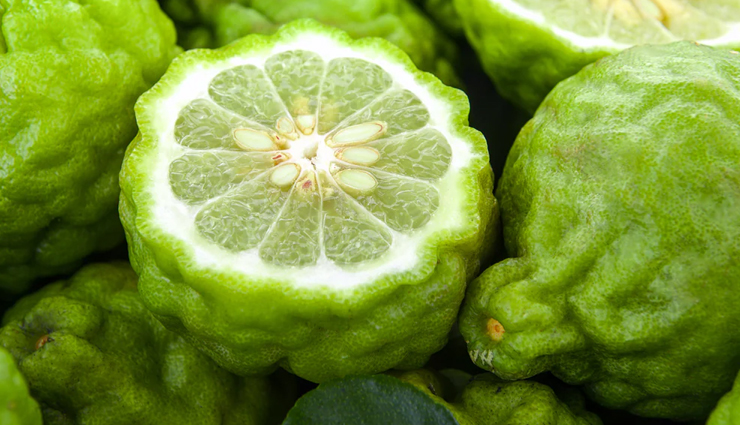Bergamot Fruit: All You Need To Know


Citrus bergamot, scientifically known as Citrus bergamia, is a fragrant citrus fruit that belongs to the Rutaceae family, which also includes oranges, lemons, and limes. It is primarily grown in the coastal regions of Southern Italy, particularly in the Calabria region. Bergamot fruit is small, round, and roughly the size of an orange, with a distinctive pear-like shape.
The fruit is characterized by its vibrant yellow or greenish-yellow color and a bumpy, textured skin. When cut open, bergamot fruit reveals its juicy, acidic, and slightly bitter pulp. However, it's not typically consumed fresh due to its tartness and bitterness.
Bergamot is renowned for its intense and aromatic citrus scent, making it a prized ingredient in the perfume and fragrance industry. It is a key component in the creation of the famous Earl Grey tea, where the essential oil extracted from bergamot rind is used to infuse black tea leaves with its distinctive flavor and aroma.
In recent years, bergamot has gained attention in the field of health and wellness due to the discovery of valuable compounds within its derivatives, such as bergamot essential oil and extract. These compounds, including flavonoids and polyphenols, have been studied for their potential health benefits, including antioxidant and anti-inflammatory properties.
Bergamot is also used in traditional medicine and natural remedies for various purposes, from soothing skin ailments to supporting digestive health. Its versatility extends to the culinary world, where it is used to flavor a variety of dishes and beverages, including desserts, marmalades, and liqueurs.
Overall, citrus bergamot is a fascinating fruit with a rich history and a wide range of applications, from enhancing the sensory experience in perfumes and teas to potentially offering health-promoting properties.Health Benefits of Bergamot
Bergamot is loaded with antioxidants like flavonoids and polyphenols, which help combat harmful free radicals in the body. This can contribute to reduced oxidative stress and cell damage.
Bergamot extract has shown promise in promoting cardiovascular health. It may help lower cholesterol levels, reduce triglycerides, and improve overall heart function, potentially reducing the risk of heart disease.
The compounds in bergamot have anti-inflammatory properties, which can be beneficial for conditions characterized by chronic inflammation, such as arthritis and inflammatory bowel disease.
Traditional medicine uses bergamot as a digestive aid. It can help alleviate digestive discomfort, bloating, and indigestion.
Bergamot essential oil is used in aromatherapy for its potential mood-enhancing effects. It may help reduce anxiety, stress, and symptoms of depression.
Bergamot oil is utilized in skincare products due to its potential to soothe skin conditions like acne and eczema. It can also promote overall skin health.
Some research suggests that bergamot extract may support weight management by aiding in the regulation of metabolism and fat metabolism.# Antibacterial Properties
Bergamot essential oil exhibits antibacterial properties, which may help combat bacteria on the skin or in the environment.
Some studies have explored the potential of bergamot in helping manage blood sugar levels, making it a subject of interest for individuals with diabetes.
Ingredients
1 bergamot fruit
Hot water
Honey or sweetener (optional)
Method
- Slice the bergamot fruit thinly, including the peel.
- Place the bergamot slices in a teapot or cup.
- Pour hot water over the bergamot slices.
- Cover and steep for about 5-7 minutes.
- Remove the bergamot slices, add honey or sweetener if desired, and enjoy your aromatic homemade bergamot tea.
Ingredients
1/4 cup extra-virgin olive oil
2 tablespoons fresh bergamot juice (about 2-3 bergamots)
1 teaspoon honey
Salt and pepper to taste
Method
- In a bowl, whisk together the fresh bergamot juice and honey until well combined.
- Slowly drizzle in the olive oil while whisking continuously to emulsify the dressing.
- Season with salt and pepper to taste.
- Drizzle the bergamot dressing over your favorite salad and toss to coat.
Ingredients
6-8 bergamots
2 cups sugar
2 cups water
Method
- Wash and thinly slice the bergamots, removing seeds as you go.
- Place the sliced bergamots in a pot, add water, and bring to a boil.
- Reduce heat, cover, and simmer for about 40-45 minutes until the fruit is soft and the liquid has reduced by half.
- Stir in the sugar and continue to simmer for another 30-40 minutes until the mixture thickens and reaches a marmalade consistency.
- Pour the hot marmalade into sterilized jars and seal. Allow it to cool before refrigerating.